A copyright lawsuit is at the center of a high-stakes fight between media behemoth The New York Times and AI upstart OpenAI. The inventor of ChatGPT, OpenAI, has now replied publicly to The New York Times’ complaint, claiming that it is “without merit.” This legal battle has far-reaching consequences for the AI business, addressing problems of fair use, partnership with news organizations, and the contentious practice of training AI models on copyrighted material.
OpenAI’s strong rebuttal
OpenAI’s public reaction begins with a clear statement of support for media, emphasizing its collaboration work with news organizations. The business denies The New York Times’ complaint, arguing that it lacks validity and underlining OpenAI’s dedication to create new opportunities through collaborations.
OpenAI’s Three Broad Allegations
OpenAI’s answer makes three important claims:
- OpenAI works with news organizations and is continuously seeking new possibilities in the sector.
- The firm claims that training on publicly available online resources is fair use, and it provides an opt-out method for authors to prohibit data access.
- OpenAI addressed the problem of “regurgitation,” describing it as an uncommon bug and emphasizing continuing attempts to reduce it.
Contextualising OpenAI’s Content Licensing Deals
The blog post tries to reconcile OpenAI’s recent content licensing agreements with big news organizations, such as Axel Springer and the Associated Press, with its practice of scraping public websites for AI training data. This step demonstrates OpenAI’s aim to match its legal status with both its partnerships and its dedication to lawful use of publicly available internet information.
The New York Times accuses of ‘intentional manipulation
OpenAI accuses The New York Times of purposely altering prompts to acquire evidence for the lawsuit, citing breaches of OpenAI’s Terms of Service. The business claims that the induced “regurgitations” were not usual user behavior and accuses the NYT of cherry-picking samples to back up its point.
A Legal Battle with Wide-ranging Consequences
As the legal procedures go, the dispute between OpenAI and The New York Times is likely to change the landscape of AI copyright policies. The legal struggle encompasses complex discussions about fair use, cooperation, and the nuances of training AI models on copyrighted content. As both sides prepare for a legal battle, the decision will almost certainly establish standards for AI development and its connection with intellectual property.



